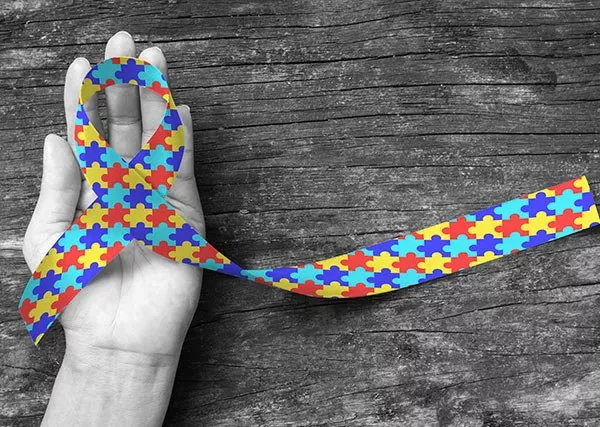The term “spectrum” helps understand the concept of autism better, as the intensity, symptoms and behavioural pattern vary considerably in each person. Children as well as adults with autism can have varied capabilities ranging from cognitive and language impairments (nonverbal and asocial) to superior cognitive and language abilities (those who pursue studies and career). Apart from learning and cognitive deficiencies, autism may also lead to sensory and feeding problems.
Autism can be managed effectively if identified and intervened in the early stages.
Early Signs Of Autism
Autism Symptoms In Babies
We recommended that you seek immediate medical advice if your baby does not:
- Establish eye contact – say, does not look at you when being fed
- Does not smile, even if you smile
- Respond when you call the baby by his/her name
- Respond to familiar voices
- Does not cuddle/respond to cuddles
- Make any noise to seek attention
- Imitate your facial expressions/movements
- Reach out to you and ask to be picked up
- Play with other people or express enjoyment
- Wave, point finger or use gestures to communicate
- Follow gestures
- Follow objects visually
- Ask for help or something he/she needs
Developmental Milestones
Get your child evaluated by a Paediatrician without delay if he/she shows delays in achieving the following developmental milestones:
- By 6 months: No big smiles or joyful expressions
- By 9 months: No sharing of sounds, smiles or other facial expressions
- By 12 months: Doesn’t respond when called by name
- By 12 months: Doesn’t babble or baby talk
- By 12 months: Doesn’t make gestures like pointing, reaching or waving
- By 16 months: Doesn’t speak/ learn words
- By 24 months: Doesn’t say meaningful, two-word phrases
Autism Symptoms In Older Children
Signs and symptoms of Autism become more pronounced as the child grows older. This can include impaired social skills, difficulties with speech and language, non-verbal communication difficulties and rigid behaviour .
Social Difficulties
- Unaware of other people or disinterested in what’s going on around them
- Doesn’t like to be touched, held or cuddled
- Won’t emotionally connect with others, play or make friends
- Doesn’t play “pretend” games, play in groups, imitate others or use toys creatively
- Has trouble in understanding or expressing feelings
- Won’t listen/ no response when spoken to
- Doesn’t share interests, achievements or toys with others
- Always in their own world - aloof and detached
Speech And Language Difficulties
- Speaks in an abnormal tone with an odd rhythm or pitch
- Starts speaking late
- Keeps repeating the same words/phrases/sounds
- Incorrect use of language
- Difficulty in communicating one’s needs
- Doesn’t understand questions and directions
- Responds to a question by repeating it
- Refers to one self as a third person
- Takes what is said literally (doesn’t understand humour or sarcasm)
Nonverbal Communication Difficulties
- Avoids eye contact
- Facial expressions doesn’t match the situation/ question
- Does not respond to other’s facial expressions, tone of voice or gestures
- Acts robotic: limited gestures
- Unusual reaction to sights, smells, textures, and sounds
- Extra sensitivity to loud noises
- Abnormal posture or way of walking
- Extreme clumsiness
- Difficulties in social interaction
Inflexibility
- Follows a rigid routine – doesn’t like change even in the smallest of things
- Difficulty in adapting to changes in schedule or environment
- Abnormal attachment to toys or even odd objects like light switches etc.
- Lines up or arranges things in a certain order
- Narrow topics of interest that often involve numbers or symbols (like memorising facts about maps etc.)
- Watching moving objects/ focusing on one specific part of an object
- Repeats the same actions/ movements over and over again (self-stimulatory behavior, or “stimming”)
Self-Stimulatory Behaviour
- Flapping the hands
- Moving fingers in front of the eyes
- Switching lights on and off
- Watching moving objects
- Staring at lights
- Repeating the same word/ noise
- Snapping the fingers
- Tapping the ears
- Scratching continuously
- Lining up toys in a pattern
- Spinning objects
- Rocking back and forth repeatedly
- Spinning in a circle
- Banging one’s head
Led by highly trained Paediatricians, Child Neurologists and Therapists, the Kids Integrated Neurology & Development Centre at Aster Medcity, Kochi (Aster KIND) offers specialised services for management of autism and neurological and neurodevelopmental disorders in children and adolescents including:
- Child Neurology services
- Neurodevelopmental services
- Child behavioural health and allied services
- Neuro rehabilitation services
- Neurometabolic & neurogenetic services
For more details, visit https://astermedcity.com/aster-kind or call: + 91 8111998074





